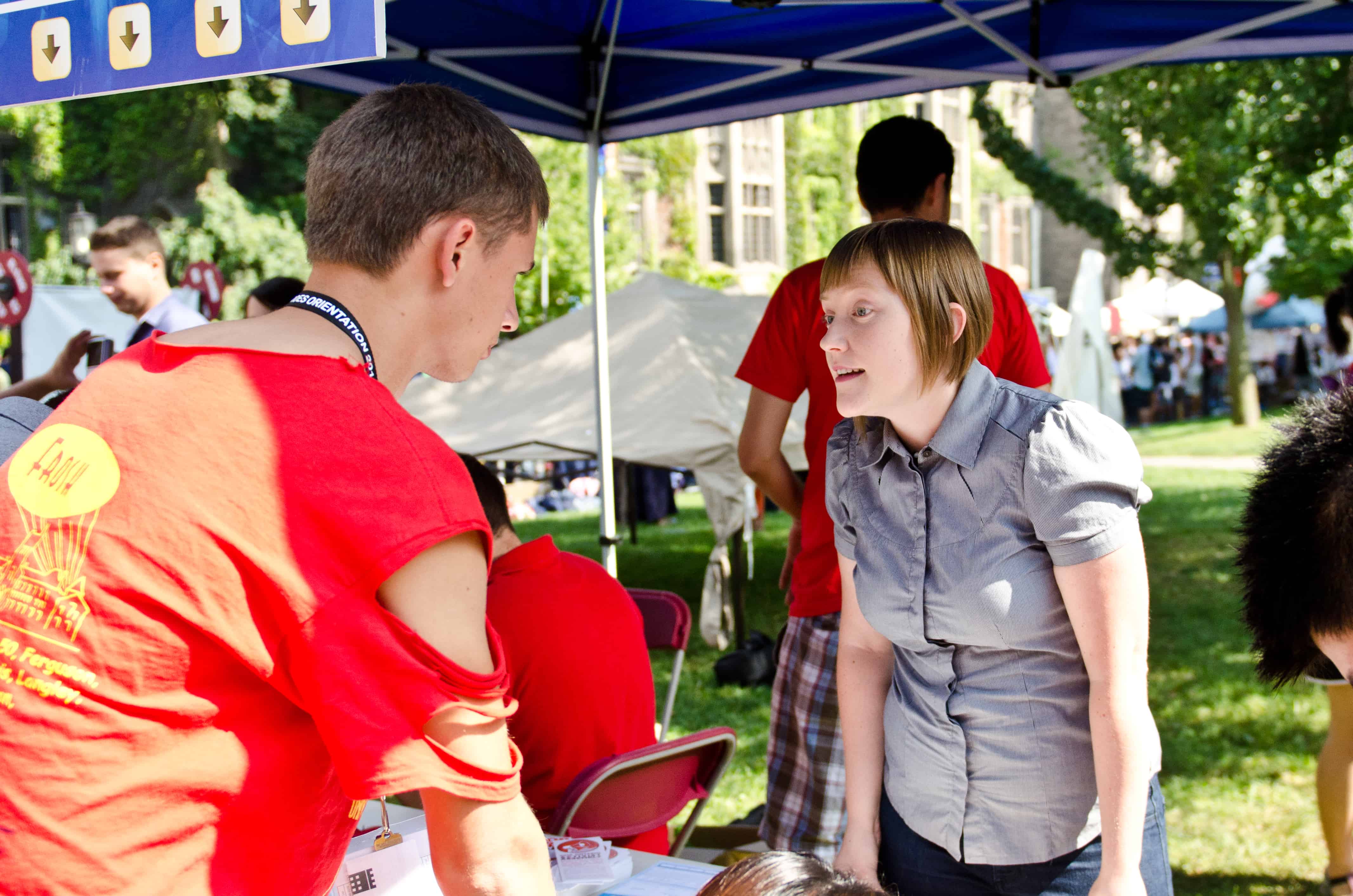It’s lunch hour at the Royal Conservatory of Music’s b Espresso Bar, where I am meeting Sarah Jayne King for her first interview with a campus newspaper since rising to the helm of the Canadian Federation of Students-Ontario this summer.
With the carre-rouge pinned prominently to her blouse, King is seated at a table in the sunlit atrium. Possessing an air of considerable self-confidence, she shows no outward signs of fatigue from her busy itinerary: a dizzying number of general assemblies, meetings with the Ministry of Training, Colleges, and Universities, protests, and, around the time of our meeting, logistical planning for a nine-day whirlwind tour of Ontario campuses featuring talks by leaders of the Quebec student strike.
[pullquote]“In Ontario, we don’t have that history of achieving student strikes to achieve an end. I think that students are inspired and are continuing to take action to ensure that our voices are heard, and a strike is a tactic that could be used.” – Sarah Jayne King, chair, CFS-O[/pullquote]
Since King was elected in August, the Ontario wing of the CFS has become increasingly involved in agitating for a Quebec-style student movement here in Ontario. Increasingly, student union leaders such as King can be seen in public wearing the distinctive red felt square in solidarity with the student protesters.
Changes at the top of CFS-O, including King’s election, come at a critical time for the organization. In addition to King’s election as chair, representatives from CFS-affiliated unions also voted to bring Toby Whitfield, previous president of the Ryerson Students’ Union, to executive office.
For years, the CFS-O has tried to rouse Ontario students into action, a task that has proven difficult in spite of the province’s sky-high tuition rates. Behind King’s efforts is a struggle by unions outside Quebec to capitalize on the ongoing strikes and demonstrations of French Canada. In her short time in office, much of King’s efforts to date been focused on this goal.
A multi-year veteran of the University of Ottawa’s student governance, King joins an organization with extensive roots in Toronto.
“I’m excited to have the opportunity to learn more about what goes on in Toronto, the North, outside of Ottawa, and to connect with other student unions to be able to push issues that affect us differently on different campuses,” she said. “My goal is to make sure that as many students and members of the general public are aware of the issues that we are fighting for and understand them in a broader context of how important postsecondary education is to us, to society in general, as well as understanding that the situation has gotten quite bad in Ontario.”
King first became involved in campus life in early 2007 as a volunteer and eventual board member of the Ontario Public Interest Research Group. While at Ottawa, she also led popular sustainable campus food initiatives, including The People’s Republic of Delicious and Simard Hall’s Café Alt.
Her second term in office began under a cloud of controversy, following a decision to overturn the victory by popular vote of her opponent, Tristan Denominee, amidst allegations that he had violated official election policy. The next year, King joined the CFS executive as treasurer.
One of the foremost challenges facing King will be repairing relations with minister Glen Murray’s office.
The CFS-O meets regularly with Murray to consult on provincial policy. Relations soured when the CFS accused the Liberals of reneging on their campaign promise to provide a tuition grant to all students. When details of the grant were handed down in January, both Murray and the CFS became publicly critical of each other.
“The problem I’m having with the CFS, in spite of significant efforts to reach out to them, is this sort of attitude of ‘give it [all to me] and give it to me today,” said Murray in a February conference call with campus media. “Every time we turn around and do something, the glass is always half-empty for them.”
King, for her part, “hopes to be able to use [her] role as an opportunity to create new and stronger relationships with all partners, whether that’s within labor or the government.”
That day in the Conservatory, King seemed optimistic, in spite of the challenges she and her organization will face. A blog post by the National Post’s Jonathan Kay ridiculed a recent protest at Glen Murray’s constituency office, suggesting there was only seven people there.
In response, the Ryerson Students’ Union released a cheery, if awkward YouTube video of the protest, featuring a crowd larger than Kay described, singing Carly Rae Jepson’s “Call Me Maybe” lyrics adapted to the student cause.
“In Quebec, there is a long history of using strikes as action to effect change, and they have largely been successful,” she explains to me. “In Ontario, we don’t have that history of achieving student strikes to achieve an end. I think that students are inspired and are continuing to take action to ensure that our voices are heard, and a strike is a tactic that could be used.”
I ask King why she thinks students in Ontario seem to react so anemically to CFS calls to action, despite the comparative severity of their tuition fees. She pauses for a moment, and says, “the level to which tuition fees have increased since the 1990s has definitely influenced students ability to get engaged.”
From the passion in her voice, it is clear that she cares deeply about the perceived plight of the average Ontario student. Her work is cut out for her. We are, as she says,“drowning in debt, working hard to put food on the own table, stay in school and make ends meet.”


